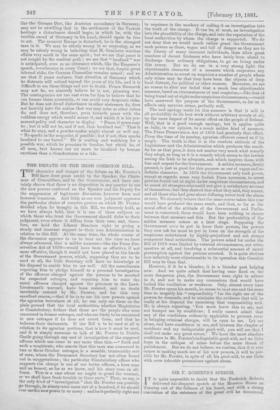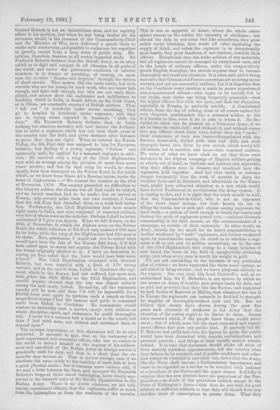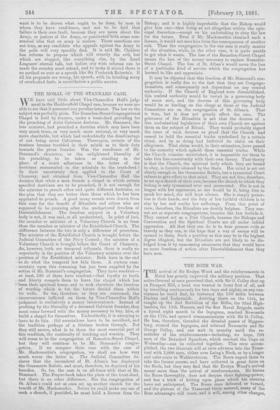SIR F. ROBERTS'S SPEECH.
1 T is quite impossible to doubt that Sir Frederick Roberts 1 delivered his eloquent speech at the Mansion House on Tuesday out of the fullness of his bead, and with a strong conviction of the existence of the great evil he denounced,
duty." Sir Frederick Roberts declares that in India cipline so stern can be pressed on a Volunteer Army, if we nothing but absolute necessity will now induce the Authori- are to keep the ranks full; and without it, and -without exces- ties to order a regiment which has not been three years in sire pay, officers must have time, before they can " make the country into the field, and gives instance after instance their companies, or turn raw louts—disappointed with the to prove that they are right. When he entered the Kuram Service, home-sick, fretful with heat and drill, and with Valley, the 8th Foot only was assigned to him for European dyspepsia burnt into them by new arraek, which would kill
infantry, but finding it a young regiment, " listless " and old sailors, not to mention raw boys—into seasoned soldiers. apparently unfit, he applied for a seasoned regiment in addi- We write of what we know when we say that there were tion. He received only a wing of the 72nd Highlanders, instances in the Afghan campaign of English soldiers getting men with an average among the privates of more than seven so utterly out of hand, so fractious and insolent and miserable, years' service ; and but for that wing he would, he states that their officers were in despair, and wondered how the openly, have been destroyed on the Peiwar Kotel, in the battle regiments held together. And but that battle or extreme which, as we know from Sher° All's Russian letters, broke the danger fortunately does the work of months in days, the heart of Afghanistan :—" We crossed the frontier on the 21st troubles there and in Zululand, and afterwards in the Trans- of November, 1878. The country presented no difficulties to vaal, might have attracted attention in a way which would the infantry soldier, the climate was all that could be wished, have forced Parliament to revolutionise the Army system. It and no forced marches had to be made ; but on arrival at is coming to this, and it is right that the truth should be told, Kuram, only seventy miles from our own territory, I found that the Commander-in-Chief, who is not an opponent that the 8th Foot had dwindled down to a weak half-batta- of the three years' system, but feels keenly its UBO in lion. Fortunately, the 72nd Highlanders had been nearly filling the ranks, has to pick and choose among regiments for eight years in India, and were composed of seasoned soldiers, hard work,—a system of itself enough to break the hearts and very few of whom were on the sick-list. Perhaps I shall be better destroy the pride of regiments passed over,—and that Generals understood if I give you figures. When we left Kuram, on the commanding in the field cannot, at the commencement of a 28th of November, to attack the Afghan army on the Peiwar campaign, be certain of their materials. in other words, an Kotel, the whole. battalion of 8th Foot only mustered 366 men Army, already far too small for its heavy responsibilities, is fit for duty, while the wing of the Highlanders had 330 men in further weakened by " unfit " regiments, and further weakened its ranks. Now, gentlemen, I would ask you to reflect what again by uncertainties among its chiefs as to whether a regi- would have been the fate of the Kuram field force, if it had meat is fit or not, and by sudden revelations, as in the case been called upon to storm and capture the Peiwar Kotel with of the 72nd Highlanders, that owing to a large infusion of the troops originally allotted to it. I have no hesitation in new blood, the force in the field is unexpectedly withering stating my firm belief that the force would have been anni- away, just when every man is worth his weight in gold. infantry, but finding it a young regiment, " listless " and old sailors, not to mention raw boys—into seasoned soldiers. apparently unfit, he applied for a seasoned regiment in addi- We write of what we know when we say that there were tion. He received only a wing of the 72nd Highlanders, instances in the Afghan campaign of English soldiers getting men with an average among the privates of more than seven so utterly out of hand, so fractious and insolent and miserable, years' service ; and but for that wing he would, he states that their officers were in despair, and wondered how the openly, have been destroyed on the Peiwar Kotel, in the battle regiments held together. And but that battle or extreme which, as we know from Sher° All's Russian letters, broke the danger fortunately does the work of months in days, the heart of Afghanistan :—" We crossed the frontier on the 21st troubles there and in Zululand, and afterwards in the Trans- of November, 1878. The country presented no difficulties to vaal, might have attracted attention in a way which would the infantry soldier, the climate was all that could be wished, have forced Parliament to revolutionise the Army system. It and no forced marches had to be made ; but on arrival at is coming to this, and it is right that the truth should be told, Kuram, only seventy miles from our own territory, I found that the Commander-in-Chief, who is not an opponent that the 8th Foot had dwindled down to a weak half-batta- of the three years' system, but feels keenly its UBO in lion. Fortunately, the 72nd Highlanders had been nearly filling the ranks, has to pick and choose among regiments for eight years in India, and were composed of seasoned soldiers, hard work,—a system of itself enough to break the hearts and very few of whom were on the sick-list. Perhaps I shall be better destroy the pride of regiments passed over,—and that Generals understood if I give you figures. When we left Kuram, on the commanding in the field cannot, at the commencement of a 28th of November, to attack the Afghan army on the Peiwar campaign, be certain of their materials. in other words, an Kotel, the whole. battalion of 8th Foot only mustered 366 men Army, already far too small for its heavy responsibilities, is fit for duty, while the wing of the Highlanders had 330 men in further weakened by " unfit " regiments, and further weakened its ranks. Now, gentlemen, I would ask you to reflect what again by uncertainties among its chiefs as to whether a regi- would have been the fate of the Kuram field force, if it had meat is fit or not, and by sudden revelations, as in the case been called upon to storm and capture the Peiwar Kotel with of the 72nd Highlanders, that owing to a large infusion of the troops originally allotted to it. I have no hesitation in new blood, the force in the field is unexpectedly withering stating my firm belief that the force would have been anni- away, just when every man is worth his weight in gold. Hated." The 72nd Highlanders remained with General We are not contending in the interests of any particular Roberts, but were supplied with a draft of 170 young plan of reform ; we have supported the three years' system, as recruits, and in tho march from Cabul to Candahar the regi- calculated to bring recruits ; and we leave proposals entirely to ment, which in the Kuram had not suffered, lost more men the experts. Our own ideal, like Lord Cardwell's, and, as we than either the 60th Rifles or the 92nd Highlanders, and understand him, Sir F. Roberts's, is any system by which we careful inquiry showed that the loss was almost entirely can secure an Army of healthy men always ready for duty, and among the men newly joined, By.andsby, all the regiments BO paid and provided that they like the Service, and supported equally will be new, and then "it will be impossible for a by such bodies of Reserves or Militia, that whenever the war is British force ever again to perform such a march as those in Europe the regiments can instantly be doubled in strength magnificent troops I had the honour and. pride to command by supplies of thoroughly-trained rank and file. But we made from Cabul to Candahar. No commander would believe that events have shown during the past five venture to undertake such a service, except with soldiers on years such elements of weakness in the Army that the whose discipline, spirit, and endurance he could thoroughly attention of the nation ought to be drawn to them. Scenes rely. I never for a moment had a doubt as to the result, but have occurred which, if the people knew them, would never then I bad tried men, not untried and untrained boys, to recur ; but of which, none but the most successful and experi-
depend upon." eneed officers dare give any public hint. If anybody but Sir The extreme importance of this statement will be at once F. Roberts had published oven the figures he gives, the public perceived. It amounts to this, that on the testimony of a most experienced and successful officer, who has no reason in would have been distracted with denials, recriminations, and personal quarrels the world to defend himself at the expense of his soldiers, ; and things at least equally serious remain , behind. It is time that statesmen should shake off some of even now one-third of the British Army on foreign service is fit for duty, and that in a short time the re- their entirely mistaken apprehensions, tell the country what practically unfit
they believe to be required, and if public confidence and adhe- reminder may become so. That is serious enough, even if we sion cannot be obtained in any other way, insist that the Army, attribute the cause solely to the inability of mere lads to bear like the Navy, shall become a Parliamentary department, and a great physical strain ; but it becomes more serious still, if cease to be regarded as a service to be watched with jealousy we read a little between the lines, and interpret Sir Frederick as a peculium of the Crown and the upper classes. It is folly to Roberts's frequent hints about indiscipline, hints clearly sup- suppose that the new electors have the prejudices of the Ten- ported in the farewell order of Sir Neville Chamberlain to the pounders—we doubt if the prejudices existed except in the Madras Army. There is no doubt whatever, we are told, Duke of Wellington's fancy—that they do not wish for good among experienced officers, that the regiments suffer as much soldiers or sufficient soldiers, or that they will shrink from any from the indiscipline as from the weakness of the recruits, sacrifice short of conscription to secure them. What they want is to be shown what ought to be done, by men in whom they have confidence, and not to be told that failure is their own fault, because they are mean about the Army, or jealous of the Army, or ponetratecrwith some non- sensical idea that an army is useless. Those assertions are not true, as any candidate who appeals against the Array to the polls will very speedily find. It is said Mr. Childers has reforms to propose which will remedy the evil, but which are stopped, like everything else, by the Land Leaguers' eternal talk, but before any wide reforms can be made the country must attend, and to make it attend there is no method so sure as a speech like Sir Frederick Roberts's. If all his proposals are wrong, his speech, with its bristling array of .overlooked facts, is nevertheless a public service.




































 Previous page
Previous page